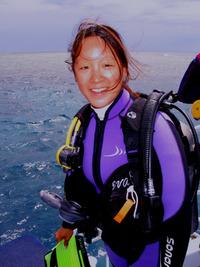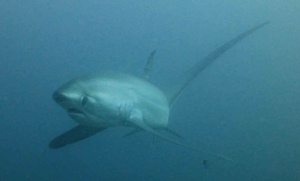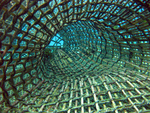Because NGOs are private, they face many problems that private business encounter – but without a profit to keep them going, reflects Benita Yue.
Tioman Island, Malaysia, September 2011. NGOs are non-government organisations, with an aim, a staff, a presence – but no financial or political motive. They are usually non-profit, professional organisations concerned with public welfare goals, and which may cater to the specific interests of certain parts of society that the state cannot access. This applies just as much to eco-sensitive NGOs, and marine-based NGOs as it does to high profile aid organisations.

Benita Yue conducts reef checks in Asia
Perhaps the most important issue for NGOs is the seemingly constant struggle for financial support. Many NGOs are heavily reliant on private donations, anything from large one-off contributions to paying volunteers – but some NGOs combine their work with business to support the basic aims financially.
Paying for Attention
For example, Blue Ventures Malaysia operates through Tioman Dive Centre on Tioman Island, utilising the dive centre’s boats, staff and equipment to carry out survey dives and reef monitoring training. The volunteers are heavily subsidised as solely using contributed or volunteer finance would be very difficult, and would require significantly different marketing.
There are a growing breed of larger organisations such as Global Vision International (GVI) and Coral Cay Conservation (CCC) that partner with local NGOs and recruit volunteers. These organisations are largely funded by the volunteers; GVI provide a break down of volunteer funds into staffing, office rental, with a significant amount for volunteer support should anything go wrong in the field. (www.gvi.co.uk/about-us/how-is-my-money-spent).
Relying on volunteers for manpower has its advantages and disadvantages. Volunteers may include those on gap year or career breaks, attracting those who really would like to make a difference and bringing fresh ideas, new knowledge, skills and enthusiasm to bring the mission(s) to reality.
But no matter how the work is financed, working for an NGO requires strong motivation. Many positions are volunteer based, and the few paid positions are generally low salaried; most NGO workers are not in it for the money.

The economic value of marine tourism is an important factor for conservation
However, relying on volunteers also requires maintaining their interest, and it is often the case that expectations are not met. Exotic pictures of white sandy beaches on conservation organisations’ websites only serve to add to this. Also, volunteer numbers have been dropping in the last few years, most likely related to the global economic situation. Imported manpower often makes up a large proportion of volunteers, and is therefore usually short lived as money is finite, and interests change.
Environmental Organisations with Government Aid
In addition to volunteers, there are groups operated by not-for-profit government funded organisations, such as ReefWatch in Australia. Such groups are designed to encourage community divers and snorkellers to monitor local dive sites, providing training and education and use volunteer manpower to undertake conservation activities. These organisations take advantage of community enthusiasm and environmentalism to secure manpower.
Some NGOs also encourage local employment, like the Thresher Shark Research and Conservation Project (TSRCP) in Malapascua, Philippines. The only paid employees are Filipinos, with an overseas-sourced volunteer science officer and education/community officer. Having local employees can increase community ownership, boost collaboration and help overcome language and cultural barriers too. While the employees are paid above the average local wage, maintaining motivation can be a challenge within a vastly different cultural background.

Thresher Shark Research and Conservation Project hire local Filipinos and involve the community in keeping the thresher shark species protected from fishing
Many NGOs try to encourage local empowerment so that environmental protection would eventually be run by the community. But if local employees do not share the same passion for conservation it is hard to imagine a lasting legacy. For example local dive guides can learn to show appreciation of marine life through simple things such as not throwing cigarette butts into the sea – but for many reasons such as different habits or culture, this can be hard in some places.
On top of staffing and money, the continuing success of any NGO depends largely on political will and government collaboration. Sadly, many governments are more concerned with economic development than with environmental protection, where in fact the two are closely interdependent.
Government collaboration with large international NGOs such as WWF and Conservation International lend support to these organisations’ efforts. Many NGOs recognise a niche in the market that attracts public attention, and play on their emotion, using flagship species like turtles or whales to increase support and awareness. But smaller and independent NGOs can struggle to gain support and community recognition, which often makes their activities short lived.

Marine NGOs are often trapped by financial constraints and can do well by partnering like-minded organisations and for greater impact
For example, there are countless number of NGOs relating to sharks or turtles, many seemingly doing their own thing and ignorant of others like themselves. Perhaps a better solution would be the partnership and sharing of resources.
Countries such as the Philippines with its rich marine resources are still influenced by wealthy landowners or military figures who dictate government policy and regulations. Environmental protection is often seen as a hindrance to development.
Playing on economic values, the TSRCP in the Philippines took a different approach, explaining the long-term economic benefit of thresher shark protection, and bringing in tourists versus fishing. Protective shark legislation was implemented, showing the powerful effect of bringing dollar values into the argument.
The work of the NGOs goes on, especially underwater. But the financing and managing doesn't get any easier. If you can help out, do! Drop a line to Blue Ventures and see if there is an opportunity for you.
Photography by Benita Yue. Check out Benita Yue's photos here.